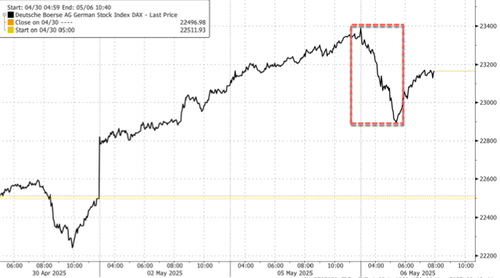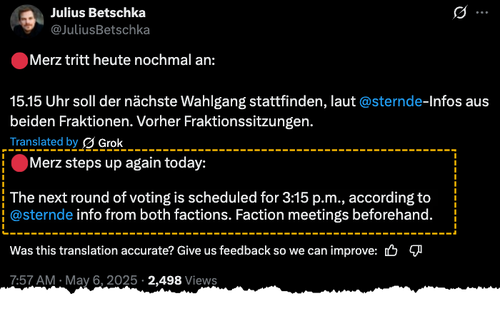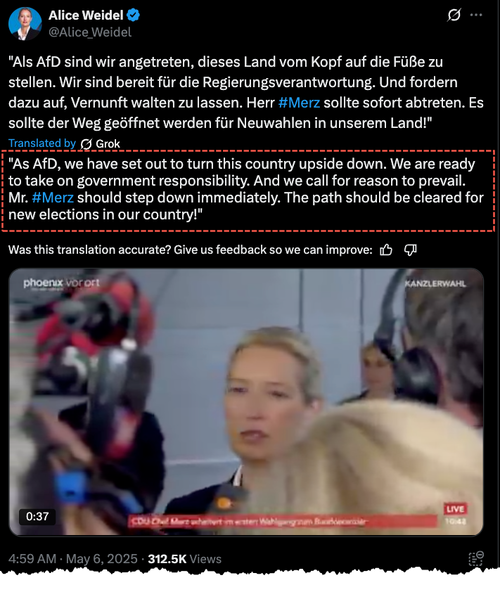German Parliament Backs Merz As Chancellor In Second Vote After "Shock" Failure In First Attempt
For Friedrich Merz, second time was the charm.
After the new German chancellor unleashed chaos in German politics when he failed to be voted through in secret ballot, getting only 310 of the 630 votes, failing to get the required 316 majority - an unprecedented outcome as it was only the first time since World War II that an incoming chancellor failed to secure the backing of lawmakers in the first round of voting in the Bundestag - moments ago following the day's second attempt to vote Merz through, he managed to squeeze through with 325 votes, managing to round up an addition 15 votes.
Commenting on the favorable result, Bloomberg says that we can rule out a coordinated attempt to derail his chancellorship, which leaves incompetence - an unfortunate mistake - as a possible reason for the earlier hiccup. The alternative is a shot across his bow, but for now by whom it remains a mystery.
Now that he has the votes, Friedrich Merz will now take the 5 minute drive along the banks of the River Spree to the presidential palace to be formally sworn in by President Frank-Walter Steinmeier and then sworn in by the Bundestag speaker before the first meeting of his new cabinet. He’s planning his first trip abroad on Wednesday, to Paris for talks with French President Emmanuel Macron and on to Warsaw to meet Polish counterpart Donald Tusk.
But the bigger question is whether this was a blip and is soon forgotten as Merz and his coalition move on to tackle Germany’s economic and political challenges -- or if it foreshadows issues of political discipline and the resultant failure to get results that could rapidly sink his chancellorship.
For those fully invested in the German success story, such as Deutsche Bank Research Economist Marion Mühlberger, the result was all that mattered: "If the new government now swiftly implements its 100-day program with the urgently needed relief measures for the German economy, the fact that it took two attempts to elect a chancellor will quickly fade into the background.”
Others were not so sure: as Manfred Güllner, head of the Forsa polling group, said earlier "even if Merz makes it in a second round, he is now damaged."
In any case, there was some relief in the stock market, with the DAX recouping most of its losses on the day, down just 0.4% now after dropping as much as 2.1% earlier. The MDAX is still down 0.7%. Now, it may take some time for investors to digest what really happened today and the potential consequences on the new government’s ability to increase spending and revive the economy.
* * *
Germany's blue-chip DAX 40 index fell nearly 2% after a new political crisis erupted in Berlin, triggered by "conservative" leader (so conservative he reneged on his election promises to halt runaway speding and crammed through a fiscal timebomb in the last days of the previous government) Friedrich Merz's failed bid to become the country's 10th postwar chancellor.
Merz needed 316 votes out of 630 to secure the chancellorship but received only 310, falling short of a majority despite his coalition holding 328 seats. Because the vote was conducted by secret ballot, the identity of those within his own party who defected remains unknown. The outcome prevented his swearing in on Tuesday and pitching Europe’s biggest economy into uncharted territory.
While the conservative leader is still expected to take charge of a ruling coalition of his CDU/CSU bloc and the Social Democrats, it was the first time since World War II that an incoming chancellor failed to secure the backing of lawmakers in the first round of voting in the Bundestag and "triggered chaos in Berlin’s government quarter", Bloomberg reported.
After the result was announced, a visibly shaken Merz left the chamber for emergency talks with his parliamentary group, the usual seamless choreography that accompanies a change of government leader in Germany in tatters.
He was due to be formally appointed by President Frank-Walter Steinmeier later on Tuesday and then sworn in by Bundestag lawmakers before a handover with outgoing Chancellor Olaf Scholz and a first meeting of his new cabinet.
Manfred Güllner, head of the Forsa polling group, told The Wall Street Journal this outcome is "dramatic," adding, "Even if Merz makes it in a second round, he is now damaged."
The immediate response in local markets was a 1.8% drop in DAX 40. German bonds trimmed declines, with the 10-year notes trading as low as 2.52% versus 2.55% before the vote.
A headline that just crossed Bloomberg moments ago indicated that the German Parliament will reconvene at 3 p.m. local time.
- GERMAN PARLIAMENT TO RECONVENE AT 1500 LOCAL TIME, 1300 GMT, ON TUESDAY AFTER FAILURE OF FIRST VOTE ON CHANCELLOR - N-TV
German reporter Julius Betschka wrote on X, "The next round of voting is scheduled for 3:15 p.m., according to @sternde info from both factions. Faction meetings beforehand."
On the other hand, if Merz fails to get elected for the second time, will that make Germany's political crisis doubly as big?
AP News provided color on what's next:
The lower house of Parliament — called the Bundestag — has 14 days to elect a candidate with an absolute majority. Merz can run again, but other lawmakers can also throw their hat in the ring. There is no limit to the number of votes that can be held within the two-week period.
If Merz or any other candidate fails to get that majority within the 14 days, the constitution allows for the president to appoint the candidate who wins the most votes as chancellor, or to dissolve the Bundestag and hold a new national election.
Trips abroad planned for Wednesday, to Paris for talks with French President Emmanuel Macron and Warsaw to meet Polish counterpart Donald Tusk, will almost certainly be postponed.
All this takes place as Germany's anti-immigrant party AfD, which was formally classified as right-wing extremist last week by the domestic security service, has overtaken Merz’s bloc in some polls and is now the main opposition force in the Bundestag.
AfD lawmakers celebrated Merz’s stumble, with co-leader Alice Weidel saying in a post on X that “this demonstrates what a weak foundation” his coalition was built on.
"As AfD, we have set out to turn this country upside down. We are ready to take on government responsibility. And we call for reason to prevail. Mr. Merz should step down immediately. The path should be cleared for new elections in our country," Weidel said.
🚨🇩🇪 ALICE WEIDEL CALLS FOR RE-ELECTIONS‼️
— Naomi Seibt (@SeibtNaomi) May 6, 2025
The designated chancellor Friedrich Merz FAILED the parliamentary election.
This is the greatest embarrassment in German history.
AfD leader @Alice_Weidel burns his very short legacy and demands national re-elections. pic.twitter.com/AEDxbuuilY
In a subsequent TV interview, Weidel said her party, which finished second in the Feb. 23 national ballot, is ready to join a coalition government.
“We can only demand that common sense prevails, Mr. Merz withdraws and the path is opened for a fresh election,” she added.
"Hardly anyone expected this scenario,” Andrea Römmele, a politics professor at the Hertie School in Berlin, told public broadcaster ARD. “A chancellor must have a majority to be able to govern. If it’s not enough at the beginning, what will happen when the going gets tough?"
Jan van Aken, the co—leader of the far-left opposition Linke party, also weighed in.
“If he can’t even unite his own people here in the Berlin bubble, how is he supposed to unite the country?” van Aken told public broadcaster ARD. “The CDU must now ask itself whether Merz is the right man for the job.”






